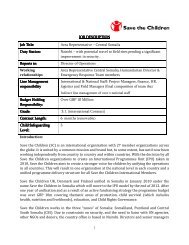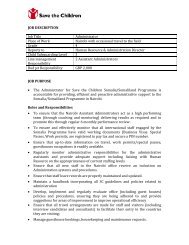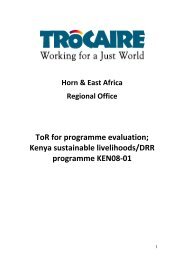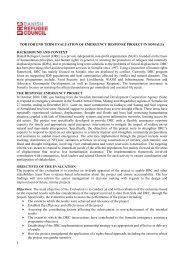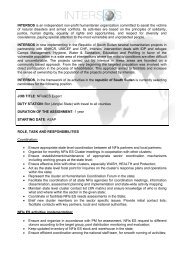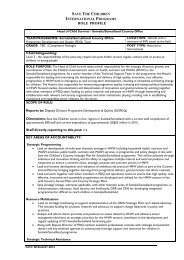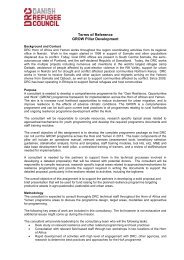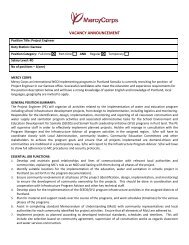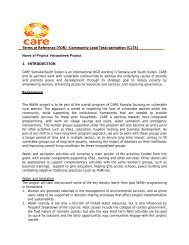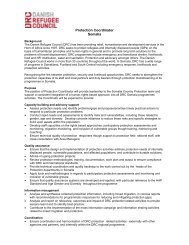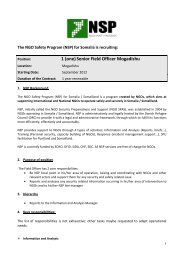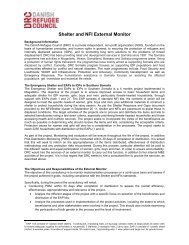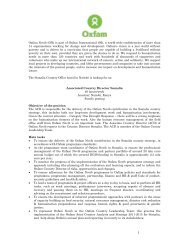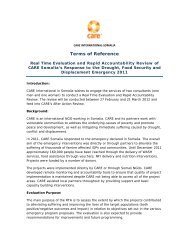TOR FOR CONFLICT ANALYSIS TOOLS AND GUIDELINES ...
TOR FOR CONFLICT ANALYSIS TOOLS AND GUIDELINES ...
TOR FOR CONFLICT ANALYSIS TOOLS AND GUIDELINES ...
You also want an ePaper? Increase the reach of your titles
YUMPU automatically turns print PDFs into web optimized ePapers that Google loves.
a) To enable communities to freely exercise their right to decide on the design, implementation<br />
and evaluation of their own development programs (Community empowerment);<br />
b) To develop and to build the capacity of local government to be more responsive to<br />
community needs (Bottom-up governance);<br />
c) To enable the delivery of sustainable and inclusive services and infrastructures (Socio and<br />
economic services).<br />
The CDRD provides both demand- and supply-driven training and technical assistance to existing<br />
institutions at community level, such as the Village Committees (which are sub-committees of the<br />
District Council) and ad-hoc community-based groups, to mobilize communities, develop plans at<br />
community level (or inform the District Development Framework -when this is in place), draft subproject<br />
proposals and budgets, manage sub-projects, and maintain services and infrastructures created<br />
by the sub-projects;<br />
In addition, the CDRD provides (a) two rounds of untied Block Grants, each round averaging USD<br />
15,000 per community, to finance a sub-project proposal developed either out of the District<br />
Development Framework, or, alternatively, of the community plan (if the former is not in place), and<br />
(b) Social Services Access Grants (SAGs), a one-off conditional cash transfer scheme, provide a grant<br />
not exceeding USD 5,000 per community to financially support the poorest and most vulnerable<br />
members in the target communities in accessing certain social services.<br />
The DIALOGUE project<br />
DRC implements the Develop Informed and Accountable Local Governance through User<br />
Empowerment (DIALOGUE) project. The overall objective of the DIALOGUE project is to support the<br />
effective participation of non-government organizations at the local level in peace-building and good<br />
governance. Specific objectives of the action are to:<br />
a) Empower communities by enabling them to freely exercise their right to decide on the design,<br />
implementation and evaluation of their own development programs;<br />
b) Promote bottom-up governance development through dialogue amongst communities and with<br />
district authorities.<br />
The above specific objectives are in common with objectives a) and b) of the CDRD project. The<br />
DIALOGUE project intends to reinforce the impact of the CDRD approach and, in particular, to<br />
complement the participatory approach of the CDRD with additional activities that are aimed to support<br />
the state building process and the reconciliation process in the target districts.<br />
To achieve the above objectives, the DIALOGUE is expected to attain the following results:<br />
1) Community committees that have been previously supported by the CDRD are able to engage<br />
in a dialogue with their government interlocutors;<br />
2) Community committees that have been previously supported by the CDRD have the capacity to<br />
prevent and resolve local conflicts;<br />
3) Inter-community small-scale sub-projects are jointly implemented by groups of community<br />
committees through sub-grants;<br />
4) Local peace-building initiatives resulting in small-scale services and infrastructures aimed at<br />
resolving conflicts between, or within, communities, are identified and implemented.<br />
2



